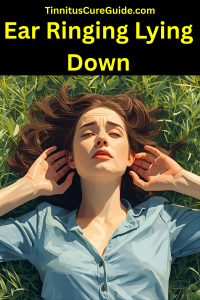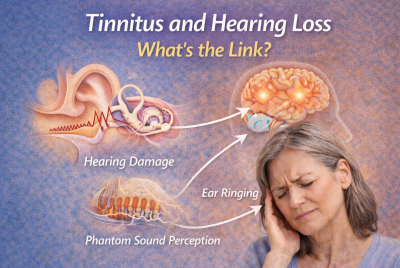Why Does My Ear Ring Only When Lying Down? Understanding Ear Ringing Lying Down
If you’ve ever noticed your ear ringing lying down, you’re not alone. Many tinnitus sufferers report that the constant buzzing, whooshing, or high-pitched noise in their ears seems louder at night or when reclining. This can disrupt sleep, increase stress, and make tinnitus feel unbearable. Understanding the reasons behind this nighttime intensification can help you manage your symptoms and improve rest.
Why Ear Ringing Worsens When Lying Down
There are several reasons why tinnitus might be more noticeable when lying down:
1. Blood Flow Changes
Lying flat alters circulation to the head and ears. Increased blood pressure in the inner ear may amplify the perception of ringing, buzzing, or pulsatile tinnitus, which often tracks with your heartbeat.
2. Positional Pressure
Sleeping on your side can create pressure on the ears, neck, and jaw. This may contribute to cervical tinnitus causes or muscle tension-related ear ringing.
3. Reduced Environmental Noise
During the day, background noise masks tinnitus. At night, in a quiet bedroom, even mild ear ringing becomes more apparent. Using white noise for tinnitus or sound masking devices can help.
4. Eustachian Tube Dysfunction
Fluid buildup or inflammation from allergies, sinus issues, or a cold can block the Eustachian tube, causing pressure and ear ringing at night, especially when lying flat.
Common Causes of Ear Ringing Lying Down
-
Cervical Tension: Neck or shoulder stiffness can increase perception of ringing when lying down.
-
High Blood Pressure: Fluctuations in circulation can affect inner ear function.
-
Sinus Congestion: Pressure changes worsen tinnitus at night.
-
Earwax Blockage: Debris can amplify sounds in a quiet environment.
-
Temporomandibular Joint (TMJ) Disorder: Jaw misalignment affects the ear nerves.
Symptoms to Watch For
If you experience any of the following, consult a healthcare professional:
-
Ear ringing that is constant or worsening at night
-
Dizziness or vertigo
-
Hearing loss in one or both ears
-
Ear pain or fullness
-
Pulsating sounds that match your heartbeat
Treatments for Ear Ringing Lying Down
1. Medical Options
-
Audiologist evaluation: To rule out hearing loss or inner ear damage.
-
Medication: Diuretics or anti-inflammatories for fluid-related tinnitus.
-
Cognitive Behavioral Therapy (CBT): Helps reduce stress associated with chronic tinnitus.
2. Home Remedies
-
Sound Therapy: Use white noise, nature sounds, or tinnitus apps to mask ringing.
-
Posture Adjustments: Elevate your head slightly with pillows to reduce pressure on your ears.
-
Heat or Cold Therapy: For neck and shoulder tension that worsens tinnitus.
-
Hydration and Diet: Reduce caffeine and sodium, which may worsen ear ringing.
3. Lifestyle Changes
-
Practice stress management: Yoga, meditation, and deep breathing.
-
Avoid prolonged headphone use or loud environments.
-
Incorporate gentle neck and shoulder stretches to relieve muscle tension and ear ringing.
Prevention Tips for Ear Ringing at Night
-
Correct Sleep Posture: Keep your head elevated and avoid sleeping on the ear that experiences more ringing.
-
Reduce Stress: Chronic stress can worsen tinnitus perception.
-
Stay Hydrated: Helps prevent inner ear fluid imbalance.
-
Use Soft Background Noise: Fans, white noise machines, or soft music.
-
Regular Neck and Shoulder Exercises: Improve circulation and reduce tension that contributes to ear ringing.
Answering the Question Directly: Can Sleeping Position Affect Ear Ringing?
Yes. The position you lie in affects circulation, pressure in the ears, and muscle tension, all of which contribute to ear ringing lying down. Evidence from studies on somatic tinnitus shows that cervical and jaw muscle tension can amplify tinnitus when reclining. Correcting posture and using supportive pillows can reduce symptoms.
Other related factors include:
-
Shoulder tightness and tinnitus: Stiff shoulder muscles may influence neck nerves that connect to the ear.
-
Neck & shoulder muscle tension ear ringing: Muscle strain can trigger or worsen ringing, especially at night.
-
How shoulder posture affects ear ringing: Slouched or forward head posture increases inner ear pressure, making tinnitus more noticeable when lying down.
When to See a Doctor
While occasional ear ringing lying down is often harmless, sure warning signs indicate it’s time to seek professional evaluation:
-
Persistent Tinnitus: Ringing that lasts more than a few weeks without improvement.
-
Sudden Hearing Loss: Any sudden decrease in hearing in one or both ears.
-
Dizziness or Vertigo: Feeling off-balance, lightheaded, or experiencing spinning sensations.
-
Ear Pain or Fullness: Severe discomfort or pressure that doesn’t resolve.
-
Pulsatile Tinnitus: Hearing rhythmic sounds matching your heartbeat, which may indicate vascular issues.
-
Other Neurological Symptoms: Headaches, vision changes, or facial numbness.
Consulting an audiologist or ENT specialist ensures proper diagnosis. They may perform hearing tests, imaging studies, or evaluate cervical and neck posture to determine if your tinnitus is linked to muscle tension, circulation changes, or underlying ear conditions. Early intervention can prevent chronic tinnitus and improve quality of life.
FAQs About Ear Ringing Lying Down
1. Why does my ear ring only at night?
At night, ambient noise decreases, making tinnitus more noticeable. Blood flow changes, neck tension, and Eustachian tube pressure can worsen ear ringing lying down, making it appear louder when you try to sleep.
2. Can posture cause ear ringing when lying down?
Yes, poor sleeping posture can strain neck and shoulder muscles, increasing muscle tension-related tinnitus. Sleeping with your head elevated or using supportive pillows can reduce pressure and lessen the intensity of ear ringing.
3. How can I sleep with tinnitus at night?
Use sound masking devices or white noise, practice stress-reducing routines, maintain proper sleep posture, and perform gentle neck stretches before bed to ease the ear buzzing sound caused by tension.
4. Can allergies or sinus issues worsen ear ringing lying down?
Yes. Congestion and fluid buildup block the Eustachian tube, increasing pressure in the middle ear. This can amplify high-pitched ear noise and ear ringing at night, especially when lying flat.
5. Are there exercises that reduce ear ringing at night?
Gentle neck rolls, shoulder shrugs, and posture exercises improve circulation and reduce neck & shoulder muscle tension ear ringing, helping prevent tinnitus flare-ups while sleeping.
6. Can diet or hydration affect ear ringing at night?
Yes. Excess sodium, caffeine, or dehydration can worsen inner ear fluid balance and circulation, making tinnitus louder when lying down. Maintaining a balanced diet supports ear health and reduces ear ringing when lying down.
7. Should I see a doctor for tinnitus only when lying down?
If tinnitus is persistent, worsening, or paired with dizziness, hearing loss, or pain, consult an audiologist or ENT specialist. Early intervention may prevent chronic tinnitus and improve ear ringing at night.
Ear Ringing When Lying Down – Conclusion
Ear ringing lying down is a common challenge for tinnitus sufferers. Understanding the causes—whether neck or shoulder tension, posture, circulation changes, or sinus issues—empowers you to take proactive steps. Combining proper sleep posture, stress management, sound therapy, and lifestyle adjustments can significantly reduce nighttime ear ringing, improve rest, and enhance overall quality of life.
Disclaimer
This content is for informational purposes only and is not a substitute for professional medical advice. If you experience persistent or worsening ear ringing, consult a healthcare professional for proper evaluation and treatment.

- Natural Remedies for Ear Ringing
- GABA Supplement for Tinnitus Relief
- Vitamin B12 Deficiency Tinnitus Relief






